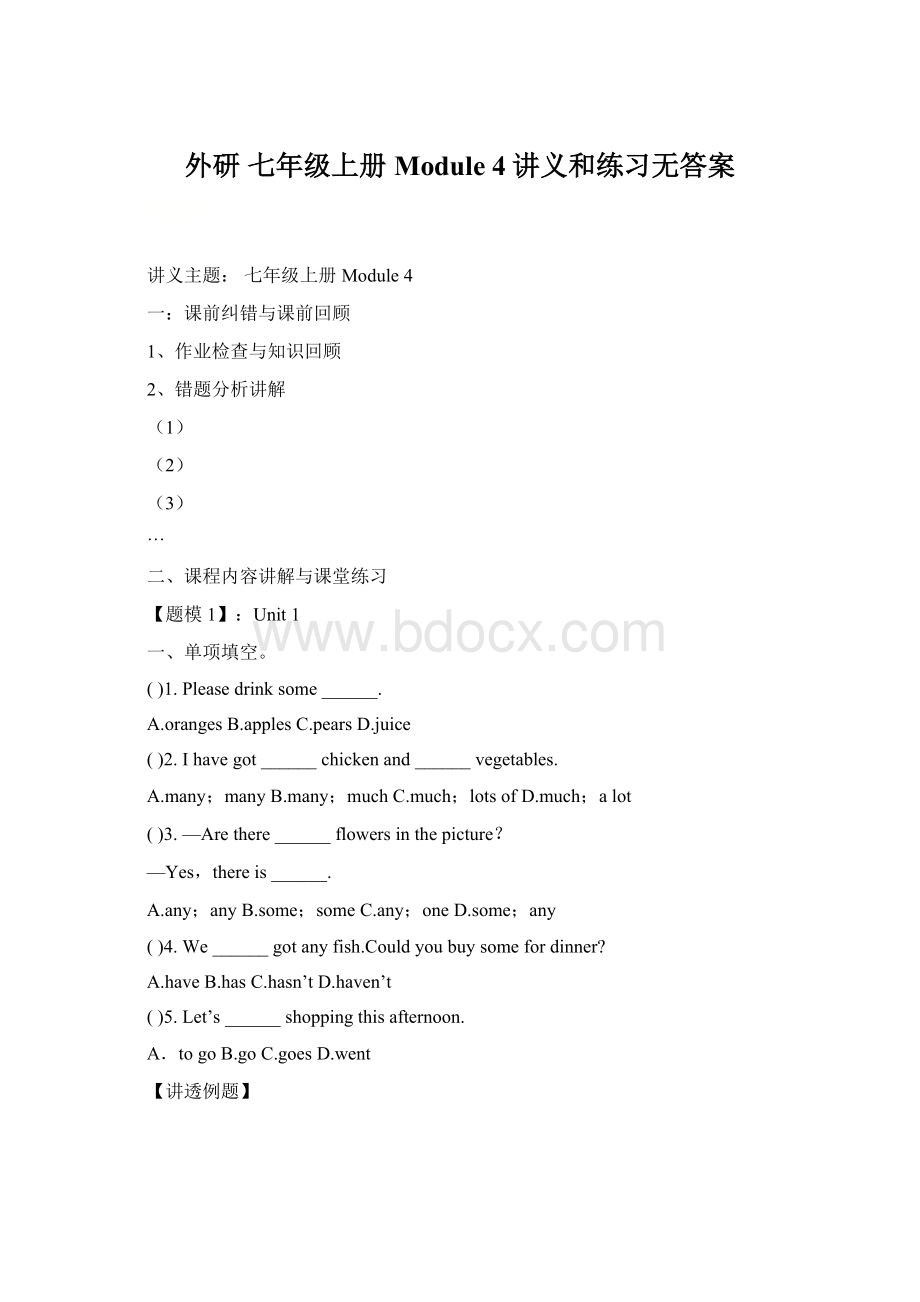外研 七年级上册Module 4讲义和练习无答案.docx
《外研 七年级上册Module 4讲义和练习无答案.docx》由会员分享,可在线阅读,更多相关《外研 七年级上册Module 4讲义和练习无答案.docx(13页珍藏版)》请在冰豆网上搜索。

外研七年级上册Module4讲义和练习无答案
讲义主题:
七年级上册Module4
一:
课前纠错与课前回顾
1、作业检查与知识回顾
2、错题分析讲解
(1)
(2)
(3)
···
二、课程内容讲解与课堂练习
【题模1】:
Unit1
一、单项填空。
()1.Pleasedrinksome______.
A.orangesB.applesC.pearsD.juice
()2.Ihavegot______chickenand______vegetables.
A.many;manyB.many;muchC.much;lotsofD.much;alot
()3.—Arethere______flowersinthepicture?
—Yes,thereis______.
A.any;anyB.some;someC.any;oneD.some;any
()4.We______gotanyfish.Couldyoubuysomefordinner?
A.haveB.hasC.hasn’tD.haven’t
()5.Let’s______shoppingthisafternoon.
A.togoB.goC.goesD.went
【讲透例题】
【讲透考点】
1.Now,wehaven’tgotanymeat.Let’sgetsomechicken.现在,我们没有肉了。
我们去买些鸡肉吧。
some和any既可修饰可数名词又可修饰不可数名词。
some一般用于肯定句或表示请求、建议的疑问句中。
any一般用于否定句和疑问句中。
(1)some既可修饰可数名词又可修饰不可数名词,常用在肯定句中。
如:
Thereare___________flowersonthedesk.桌上有些花。
CanIhave_________water?
能给我些水吗?
(2)在表示建议、反问、请求的疑问句中,或期望得到肯定回答时,多用some而不用any。
如:
Wouldyoulike_______________coffee?
你要不要来点咖啡?
Howabout_______________fruitjuice?
来点水果汁如何?
(3)any可修饰可数名词复数或不可数名词,常用于疑问句和否定句中。
如:
Ican’tsee___________tea.我没看见茶叶。
Doyouhave____________friendsatschool?
你在学校有些朋友吗?
(4)any也可用于肯定句,但表示的是“任何一个”的意思,后常接可数名词单数。
如:
_______________studentcananswerthisquestion.任何学生都可以回答这个问题。
2.Toomuchchocolateisn’tgoodforyou.(吃)太多巧克力对你不好。
(1)toomuch意为“太多”,用来修饰不可数名词;toomany意为“太多”,用来修饰可数名词复数。
如:
Ihavegot__________homeworktodotoday.我今天有太多的作业要做。
Thereare_______________studentsinourclass.我们班上有太多的学生。
(2)begoodfor意为“对……有好处”,它的反义词组是bebadfor。
如:
Fruitandvegetables__________yourhealth.水果和蔬菜对你的健康有好处。
Playingtoomuchcomputergamesis______________________youreyes.
玩太多电脑游戏对你的眼睛不好。
3.Whatkindoffruit?
哪种水果?
kind在此作可数名词,意为“品种,种类”。
在英语中,表示“一种……”常用akindof…;表示“各种各样的……”用allkindsof…或differentkindsof…。
而whatkindof则表示“哪一种,哪一类”。
如:
(1)—__________________fruithaveyougot?
你有哪一种水果?
—Ihavegotapples.我有苹果。
(2)Thereare____________bagsintheshop.商店里有各种各样的包。
【相似题练习】
一、根据中文意思或首字母提示,用单词的适当形式填空。
1.Howaboutsomeorange_______(果汁)?
2.Therearelotsof__________(西红柿)inthefridge.
3.Wehaven’tgotany__________(水果).
4.Haveyougot___________(一些)chocolate?
5.Runningis___________(有益的)foryourhealth.
6.Thereisaboxof___________(巧克力)onthedesk.
7.Whatk_________ofmeatdoyoulikebest?
8.Therearel_________ofapplesonthedesk.
9.Wehavegots_______________tomatoesinthefridge.
10.Don’tdrinktoom_______________cola.
二、根据中文提示完成句子,词数不限。
1.买些土豆怎样?
___________buyingsome____________?
2.我们没有水果了。
我们去买些吧。
We______________fruit.Let’s___________.
3.我妈妈有许多好朋友。
Mymother____________goodfriends.
4.吃太多冰激凌对你不好。
Eating___________icecream______________you.
5.我通常周末去购物。
Iusually_____________onweekends.
三、单项填空。
()1.Drinking______colaisn’tgoodforyou.
A.toomanyB.toomuchC.manytooD.muchtoo
()2.—Haveyougotanyeggs?
—______,I______.
A.Yes;haveB.Yes;gotC.Yes;haven’tD.No;havegot
()3.—Let’sgetsomemilkandbread!
—______.
A.GoodjobB.WelldoneC.GoodideaD.Itdoesn’tmatter
()4.Howabout______onSunday?
A.goshoppingB.goingshoppingC.gotoshopD.gotoshopping
()5.Therearen’tany______onthetable.
A.beefB.chickenC.fishD.apples
【题模2】:
Unit2
一、单项填空。
()1.Thefishisso______thateveryoneenjoysit.
A.badB.wellC.deliciousD.fat
()2.Toomuchmeatisbad______children.
A.forB.toC.inD.of
()3.Ioftenhaveaneggandsomebread______breakfast.
A.inB.atC.forD.of
()4.Eating______foodisgoodforour______.
A.health;healthB.healthy;healthyC.health;healthyD.healthy;health
()5.Itisimportantforustohave______breakfasteverymorning.
A.aB./C.anD.the
【讲透例题】
【讲透考点】
1.Abittired?
有点儿累了吗?
abit意思是“有点儿,稍微”,可以用来修饰形容词、副词和动词;与alittle,alittlebit,kindof同义。
如:
Theshoesareabitold.这双鞋有点旧了。
Heisabitangry.他有点儿生气了。
2.Itisimportanttoremember:
eatwell,stayhealthy,anddon’tgetfat!
记住这些很重要:
吃好,保持健康,不要发胖!
(1)remember是及物动词,意为“记住;想起”。
remembertodosth.记得做某事(还未做);rememberdoingsth.记得做过某事(已做)。
如:
Itisimportantto_______________thewords.记住这些单词很重要。
Pleaseremember_______________(close)thewindowafterschool.请记得放学后关窗户。
Iremember_____________(close)thewindowbeforeIgotoschool.我记得我上学前关了窗户。
(2)stayhealthy意为“保持健康”。
stay此处用作系动词,意为“保持”,其后常接形容词作表语。
如:
Thedoor__________everyday.这道门每天都开着。
3.Eatnoodlesorrice,nothamburgers.吃面条或米饭,而不是汉堡包。
or用于否定句意为“和”,用于疑问句中意为“还是,或者”。
如:
Idon’thaveahouse________acar.我既没有房,也没有车。
Doyoulikebasketball________football?
你喜欢篮球还是足球?
【相似题练习】
一、根据中文意思,用单词的适当形式填空。
1.Eatingtoomuchsugarisnotgoodfor_______________(孩子).
2.Ifyoufeelabit_______________(累),you’dbettertakearest.
3.It’simportantto_______________(记得)toeatwellandstayhealthy.
4.Pleasehavelotsof_______________(美味的)chickensoup!
5.Hehadsomefishand_______________(面条)forlunch.
6.Hewalksa___________(一点儿)fast.
7.Maryisa_______________(健康的)girl.
8.Sheplaysbasketball_______________(好地).
9.Thegirlisvery_______________(肥胖的).
10.Ilike_______________(甜的)food.
二、根据中文提示完成句子,词数不限。
1.如果你想保持健康,你要多吃蔬菜和水果。
Ifyouwantto_____________,youmusteatmore__________________.
2.请多吃健康的食物,而不是糖果和冰激凌。
Pleaseeat_________________,notcandyoricecream.
3.你们在家吃早餐吗?
Doyou______________________athome?
4.多喝水是非常重要的。
It’svery_________________morewater.
5.牛奶、奶酪和鱼对你的牙齿有益。
Milk,cheeseandfishare_____________.
三、单项填空。
()1.Hehasn’tgotacar______ahouse.
A.andB.soC.orD.with
()2.Ithinkthefoodis______expensiveonfestivals.
A.muchB.bitC.abitD.abitof
()3.Haveyougot______tea?
A.anyB.someC.abitD.much
()4.Itisimportant______Englishwell.
A.learnB.tolearnC.learnedD.learning
()5.Thebeefis______delicious,butdon’teat______.
A.toomuch;toomuchB.muchtoo;toomuch
C.toomuch;muchtooD.muchtoo;toomany
【题模3】:
Unit3
一、单项选择
1.Hereisa________.Youcanhaveit.
A.apple B.fruit C.icecream D.Banana
2.(2015·绥化)There________littlemilkinthefridge.Let'sgoandbuysome.
A.hasB.isC.Are
3.(2015·安顺)Herearesome________.Doyoulike________?
A.oranges;themB.orange;itC.oranges;theyD.oranges;their
4.Howmany________hashe________?
A.book;getB.book;gotC.books;getD.books;got
5.YesterdayfordinnerIhadapieceofbeef,vegetablesand________.
A.somericeB.ariceC.somericesD.alittlerices
【讲透例题】
【讲透考点】
(一)have/hasgot的用法
havegot意为“有;拥有”,表示的是一种所属关系,即“某人有……”。
其结构为:
主语(sb.)+have/hasgot+其他。
【考点1】
1.havegot的意思是“有”,在句子中作谓语,随着句子主语人称的变化而变化。
句子的主语是第三人称单数he或she时使用hasgot;句子的主语是I,we,you或they时使用havegot。
如:
(1)He/Shehasgotanewcoat.他/她有一件新外套。
(2)You/We/They/Ihavegotacomputergame.你(们)/我们/他们/我有一个电脑游戏。
2.含have/hasgot的句子变为否定形式时,要在have/has后加not(havenot可缩写为haven’t,hasnot可缩写为hasn’t)。
如:
(1)She/Hehasn’tgotanewcoat.她/他没有一件新外套。
(2)You/We/They/Ihaven’tgotacomputergame.你(们)/我们/他们/我没有一台电脑游戏。
3.含have/hasgot的一般疑问句结构为“Have/Has+主语+got+其他?
”,肯定回答为“Yes,主语+have/has”,否定回答为“No,主语+have/has+not”。
如:
(1)—Hashegotanewcoat?
——他有一件新外套吗?
—Yes,hehas./No,hehasn’t.——是的,他有。
/不,他没有。
(2)—Haveyougotacomputergame?
——你有电脑游戏吗?
—Yes,Ihave./No,Ihaven’t.——是的,我有。
/不,我没有。
(3)—Havetheygoteightapples?
——他们有八个苹果吗?
—Yes,theyhave./No,theyhaven’t.——是的,他们有。
/不,他们没有。
【考点2】辨析therebe,have/hasgot,have
(1)therebe表示存在关系,表示某处有某人或某物。
eg:
Thereisapictureonthewall.墙上有幅画。
(2)动词have/hasgot和have表示所属关系,经常用“人”作主语,表达“某人有……”。
英国人喜欢用havegot;美国人用have。
eg:
Ihave(got)agoodfriend.我有一位好朋友。
(3)当表示整体与局部含义时,或者难以判断是所有关系还是存在关系时,have和therebe均可使用。
eg:
Therearesevendaysinaweek.
=Aweekhassevendays.一星期有七天。
(二)可数名词与不可数名词
1.可数名词的构成方法
(1)一般情况加-s。
如:
map—mapsboy—boysgirl—girlspen—pensbag—bagscar—cars
注意:
清辅音后读/s/,浊辅音和元音后读/z/。
(2)以s,sh,ch,x等结尾加-es,读/iz/。
如:
bus—buseswatch—watchesbox—boxesbrush—brushes
(3)以辅音字母+y结尾,变y为i再加-es,读/z/。
如:
baby—babiescity—citiescountry—countries
但以y结尾的专有名词,或“元音字母+y”结尾的名词变复数时,直接加-s变复数。
如:
monkey—monkeysholiday—holidays
(4)以o结尾的名词,变复数时:
①表示无生命个体加-s。
如:
photo—photospiano—pianosradio—radioszoo—zoos
②表示有生命个体加-es。
如:
potato—potatoestomato—tomatoes
(5)以f或fe结尾的名词变复数时把f,fe改为ves。
如:
knife—knivesleaf—leaveswolf—wolveswife—wiveslife—lives
2.名词复数的不规则变化
(1)child—childrenfoot—feettooth—teethmouse—mice
man—menwoman—women
注意:
由一个词加man或woman构成的合成词,其复数形式也是-men和-women,如:
anEnglishman,twoEnglishmen。
但German不是合成词,故复数形式为Germans。
(2)单复数同形,如:
deer,sheep,fish,Chinese,Japanese,yuan等。
(3)表示由两部分构成的东西,如:
glasses(眼镜),trousers,clothes等,若表达具体数目,要借助数量词pair(对,双),suit(套)等,如:
apairofglasses,twopairsoftrousers等。
3.不可数名词:
不可数名词主要分物质名词和抽象名词。
(1)物质名词是指表示无法分为个体的实物的词,常见的物质名词:
snow(雪),rain(雨),water(水),coffee(咖啡),tea(茶),meat(肉),milk(牛奶),rice(米饭),bread(面包),
orange(橙汁),beef(牛肉),chicken(鸡肉),juice(果汁),pork(猪肉),Coke(可口可乐),icecream(冰激凌)等。
(2)抽象名词是指表示动作、状态、品质、感情等抽象概念的词,常见的抽象名词:
work(工作),study(学习),love(爱),friendship(友谊)等。
【相似题练习】
二、用所给词的适当形式填空
6.Tomhasgotlotsof________(potato).
7.Howmany________(family)arethere?
8.Shebrushesher________(tooth)everymorning.
9.There________(be)twobottlesofmilkinthefridge.
10.Chocolateandcola________(be)badforyou.
三、按要求完成句子
11.Hehasgotsomemeat.(改为一般疑问句)
________he________________meat?
12.Ihavegotsomebread.(改为否定句)
I________________________bread.
13.Bettyhasgotabighamburger.(用asmallhamburger改成选择疑问句)
________Betty________abighamburger________asmallhamburger?
14.Myunclehasgottwocomputersinhishouse.(改为同义句)
____________twocomputersinmyuncle'shouse.
15.TherearesomenewbooksinTony'sbag.(改为同义句)
Tony________________somenewbooksinhisbag.
3、课后练习
(1)单项选择
阅读理解